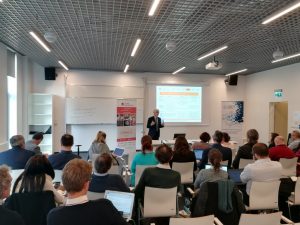After having selected 14 new FabSpaces in various countries worldwide at the end of 2017, the FabSpace 2.0 project today officially inaugurated the first joint activity of the fourteen new FabSpaces during the FabSpace 2.0 Workshop on Sharing Practices to Spread the FabSpace Spirit. The workshop was held in Centre for Innovation and Technology Transfer Management of Warsaw University of Technology, Warsaw, Poland.
During the workshop, three key words are used as the main focus: Innovation, Simulation, and Earth Observation (EO). FabSpace 2.0 project aimed to stimulate (open) innovation in Earth Observation (among universities, civil society, corporates and public authorities) to make our planet a better place to live in by connecting EO (experts/data/SW) to other communities. This goal can be reached by providing trainings (technical, entrepreneurship, Bootcamps, etc.), workshops, innovation events, open days, infrastructure, communication, etc.
This workshop also placed a specific aim on sharing practices regarding operational and local awareness strategy. In this respect, the FabSpace 2.0 consortium stands ready to assist in the development of a comprehensive growth strategy for the new FabSpaces. The new FabSpaces will help consolidate the FabSpace 2.0 project’s mission all over the world, disseminating the services and helping to address the needs of final users of Earth Observation and geodata-based applications. The list of the new FabSpaces can be seen here.
This workshop was a one-day event attended by the consortium and the new FabSpaces representatives from France, Italy, Czech Republic, Spain, Lithuania, Armenia, Cyprus, The Netherlands, and Cameroon. The event was part of FabSpace 2.0 project progress meeting which held annually. Project Coordinator Josiane Mothe from University Toulouse III – Paul Sabatier (UPS), said: “I was very happy to welcome the new FabSpaces representatives. I found them very motivated. I’m convinced that they will be very successful in spreading the FabSpace spirit. They have complementary domain applications than the founder FabSpaces, come from different countries for some of them. All this is a real opportunity for spreading the FabSpace concept.”
Upon officially inaugurated, each FabSpace could offer a “Space Science Shop” service, that collects the needs and the societal challenges of external stakeholders (Civil Society Organisations, Public Authorities and Companies), linked to application domains of EO and satellite navigation uses (i.e., Agriculture and Forestry; Energy; Environment and resource efficiency; Intelligent Transport Systems; Smart cities; Health and well-being). The scope is to provide independent participatory research support in response to concerns experienced by external stakeholders, offering a demand-driven and bottom-up approach to the FabSpace facility and screening questions provided by these stakeholders.
One of the new FabSpaces manager, Prof. Diofantos G. Hadjimitsis from ERATOSTHENES Research Center, Cyprus University of Technology said, “The ERATOSTHENES Research Center is excited to have joined the FabSpace 2.0 project. We believe that the FabSpace 2.0 network shares our goals and vision to develop and promote innovative Earth Observation applications and services using open spatial data and geo-information technologies. This provides the ERATOSTHENES Research Center at the Cyprus University of Technology (School of Engineering and Technology) within the EXCELSIOR project (www.excelsior2020.eu) with the ability to become an open innovation centre in the Eastern Mediterranean region and improve its contribution to the socio-economic and environmental performance of Cyprus through the development and application of innovative Earth Observation applications, products and services. We believe that FabSpace approach brings a significant added-value in the promotion of new EO based applications and paves the way for the creation of new start-ups providing job opportunities and professional growth for students and researchers, establishing mutually beneficial relationship in Europe and beyond.”.
The founder FabSpaces and the new FabSpaces are part of the international FabSpace 2.0 network that will be launched at the beginning of 2019, and its legal status will be defined according to the results of the report on European and Non-European initiatives with which FabSpace 2.0 can create synergies. To this aim, existing initiatives, mainly in Europe, will be monitored and possible actions will be defined. Given the particular added value of Earth Observation data and Satellite Navigation services in countries with less ground infrastructures (i.e. developing countries) specific attention will also be given to the developing countries as much business markets are expected to grow. In the end, the network will be extended worldwide.

Figure 1. FabSpace 2.0 Workshop with the New FabSpaces





